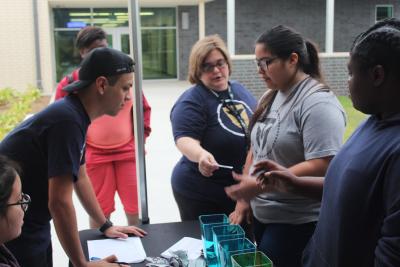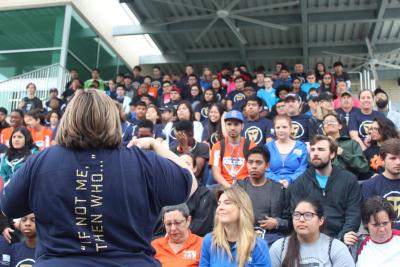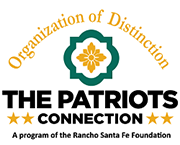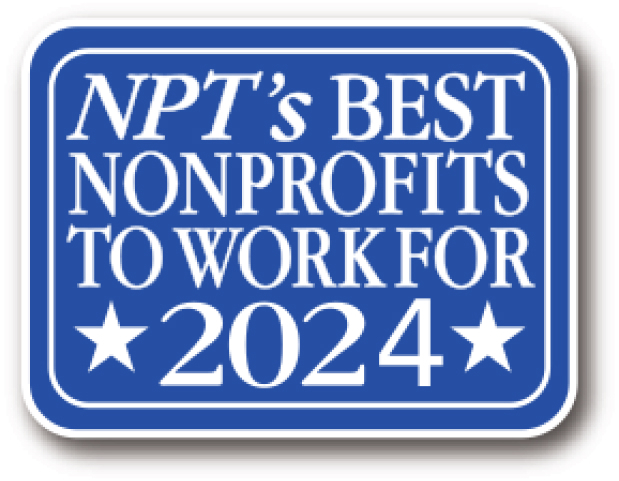Character in the Classroom: Meet the educators who make our programs possible
When Travis Manion Foundation set out to develop and inspire character in youth, the future leaders of our nation, we didn’t anticipate how significantly our Character Does Matter program would grow, or the impacts it would have coast-to-coast.
Ten years later, TMF’s signature mentorship program has reached 250,000 youth, from elementary schools in New York City to high school leadership conferences in Montana. While the 1,000 youth mentors across TMF are to thank for such growth, these programs wouldn’t be as impactful, let alone possible, without advocates behind the scenes.
Teachers – the unsung heroes of character education – are reaching out to regional TMF staff every day, seeking impactful programs to bring their students, new methods to implement character in the classroom, and passionate mentors who want to volunteer their time.
Two educators, Rebecca De La Rosa and Tara Hipple, have been instrumental in making our youth-development programs a success in their respective schools. They have both seen the impacts of character education on their students, and continue the lesson in their classrooms and schools after their mentor leaves.
TMF reached out to De La Rosa and Hipple to discuss the importance and effects of character education on students, student bodies, and communities at large.


Travis Manion Foundation: Where do you teach, what grade and subject, and for how long?
Rebecca De La Rosa: I teach at Energy Institute High School in Houston Texas. I am beginning my fifth year at Energy and have been in Houston ISD 19 years total.
Tara Hipple: Thomas Grover Middle School [in New Jersey], eighth-grade science for 10 years.
TMF: Why is character education important to our youth? What are some impacts you've seen as part of this programming?
RDLR: Students need to believe in a world that is bigger than their school and neighborhood.  They need to realize that even if they are not in the best situation themselves, there are others who may need a hand-up too. The diversity of activities with which we partner with TMF allows us to reach out and touch our community through a myriad of events and activities. If you want to build your leadership skills, the Character and Leadership course is there. If you want to help hospitalized children, we have craft-building days. We also use these days as outreach in our community; our biggest day of service had 150 volunteers and a full neighborhood of sites – people’s home, a church, an urban garden, three city parks, and a bayou trail. Students gardened, cleaned, and worked in tandem with neighborhood organizations – and learned about the value of service in the process. This, in turn, builds a character that is giving, is selfless.
They need to realize that even if they are not in the best situation themselves, there are others who may need a hand-up too. The diversity of activities with which we partner with TMF allows us to reach out and touch our community through a myriad of events and activities. If you want to build your leadership skills, the Character and Leadership course is there. If you want to help hospitalized children, we have craft-building days. We also use these days as outreach in our community; our biggest day of service had 150 volunteers and a full neighborhood of sites – people’s home, a church, an urban garden, three city parks, and a bayou trail. Students gardened, cleaned, and worked in tandem with neighborhood organizations – and learned about the value of service in the process. This, in turn, builds a character that is giving, is selfless.
TH: Character education is VITAL!! Society and technology are advancing and changing so much…in both positive and negative ways. Social media has taken hold of middle school students and how they communicate with each other. While it allows them to extend outside of their school “bubble” to meet new people and learn about different cultures, it also seems to give some teenagers a sense of anonymity and aggression which they may not have had before “screen time.” Character education presents opportunities for students to explore and use the best of themselves and to extend it to their communities.
"Character education presents opportunities for students to explore and use the best of themselves and to extend it to their communities."
TMF: Do you think today's students receive enough mentorship (at home or in school)? Why or why not?
RDLR: I think our school is a very special place – because the school is small and the cohort system we use is even smaller, we get to have a long time getting to know our kids.  We also value mentorship through corporate partnerships with our projects. Our students have clubs where they mentor each other. As for the home life – it varies. Our school is very diverse in its population – we have extremes in wealth and poverty. We have generational poverty and multigenerational success stories. Some kids have great mentors in their lives through parents, church, leadership, scouts, others have nothing.
We also value mentorship through corporate partnerships with our projects. Our students have clubs where they mentor each other. As for the home life – it varies. Our school is very diverse in its population – we have extremes in wealth and poverty. We have generational poverty and multigenerational success stories. Some kids have great mentors in their lives through parents, church, leadership, scouts, others have nothing.
TMF’s courses allow students to see people who look like them and who have had success in the military. These mentorship experiences are very valuable to them. In schools unlike Energy – the teacher-to-student ratio is extreme and not beneficial to the teacher or the child. These students truly need mentors.
TH: Yes and No. I believe that there are phenomenal mentors around youth everyday but the ability to access them seems to be lacking. Either students do not know how to ask an adult or peer to mentor them or the adult may not feel confident enough in themselves to reach out to a program in need of mentors.
"TMF’s courses allow students to see people who look like them and who have had success in the military. These mentorship experiences are very valuable to them."
TMF: If you had to pick one, which character strength do you think is most important for our youth to learn today and why?
RDLR: Perseverance. This summer, when I went to Philly for the Character Lab Workshop, Angela Duckworth, one of the event organizers, spoke about grit. Grit is what allows the under-resourced scrappy kid to play on a level with a student from a more sufficient background. Perseverance is the difference between the A student who is content with a C grade and the C student who is really a D student who pushes himself or herself to work even harder.
Today’s youth lack the patience for anything. Since all information is now available in an instant, seldom they have to work long and hard for anything beyond their favorite video game quest. Teaching them Perseverance through service is paramount to their future success in college and beyond.
TH: Whew! This is a tough one. There is a place for each of the strengths in developing globally aware, well-rounded young people but certainly Curiosity and Perspective go hand in hand. Curiosity will give students the drive to learn and explore, to experience new languages, cultures, and studies, but Perspective gives the ability view differences through a lens of acceptance and tolerance.
TMF Stats:
001
78,000+
Veterans + Survivors Empowered
002
300,000+
Spartan Members
003
750,000+
Youth Living "If Not Me, Then Who..." Movement







